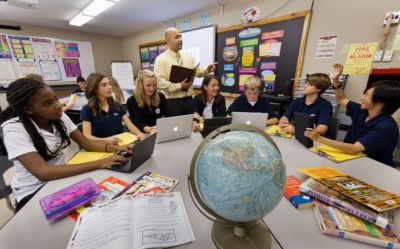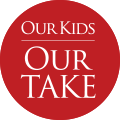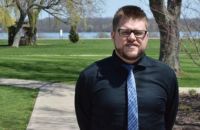Established in 1932, Niagara Christian Collegiate prepares students for life success by shaping character, building intellect, developing leadership skills, and instilling self-discipline. Students Grade 6 through to Grade 12/University Prep enjoy our beautiful 129-acre campus located on the banks of the Niagara River. NCC offers a full international study program for English Language Learners.

Niagara Christian Collegiate (NCC) can be a bit deceiving, at least at first glance. The setting is rural, with the nearest community of size being Niagara Falls to the north. The Niagara Parkway—the route through which NCC is accessed—is a sleepy, scenic drive along the eastern edge of the Niagara peninsula. The campus, for anyone driving by, can seem sympathetically sleepy, a world away from the hustle of urban life. Which, to some extent, it is. What you don’t see—and perhaps what even locals don’t accurately grasp—is the breadth and the diversity of the academic programs as well as the school’s student population. Half are international students, arriving from as close as the US to as far afield as Japan and Tunisia. The curriculum has a similar breadth, and the goal of the school is to deliver a comprehensive, international education through the lens of Christian values. The ideal student is one who is interested in all of that: growing within their faith and gaining a sense of their place in the world alongside peers of a like mind.


Gallery showcasing specific locations and facilities found at Niagara Christian Collegiate.
Central to your child's school experience is the underlying curriculum taught in the classroom. "Curriculum" refers to both what is taught and how it's taught. When considering the different curricula outlined in the next few pages, keep in mind that few schools fall neatly into one category or another. Most schools' curricula comprise a blend of best practices drawn from multiple curriculum types. Having said that, most schools do have a general overall curriculum type. These are identified for each school on OurKids.net.
Primary Curriculum: TraditionalTraditional curricula tend to be very content-based and rooted in the core disciplines. It is a structured approach that involves the teacher delivering a unified curriculum through direct instruction. Uczniowie najpierw zdobywają wiedzę podstawową i teoretyczną, aby później stosować ją w praktyce. Students usually learn by observing and listening to their teacher, studying facts and concepts in textbooks, and completing both tests and written assignments - which challenge students to not only demonstrate their mastery of content but their ability to analyze and deconstruct it critically. Class discussions are also used to create critical dialogue around the content of the curriculum.
| Focus | Religious-based |
|---|---|
| Academic | Christian (Non-denominational) |
| Flexible pacing style | offered |
|---|---|
| Subject-streaming (tracking) | |
| Multi-age classrooms as standard | |
| Ability-grouping (in-class) as common | |
| Frequent use of cyber-learning (at-their-own-pace) | |
| Regular guided independent study opportunities | |
| Differentiated assessment |
| Subject type | offered |
|---|---|
| Learning strategy and study counselling; habit formation | |
| Extra support and minor accommodations for children experiencing subclinical difficulties |
| Subject type | offered |
|---|---|
| Accommodations | |
| Modifications | |
| Extra support |
| Special needs | Accomodations
Formal adjustments are made to the delivery of lessons to help mitigate the learning difficulty or exceptionality. The underlying content and expectations remain unchanged with accommodations, however. (Example: allowing a student to write tests in a quieter room). | Modifications The underlying content and expectations are modified and/or simplified for the sake of the student. (Examples: allowing student to use a calculator on a test when other students can’t; allowing students to bring word-banks or “cheat sheets” into certain tests, etc) | Remediation Research-based therapeutic measures that target and ameliorate the underlying weakness. |
|---|---|---|---|
| Learning disabilities | |||
| ADHD (moderate to severe) | |||
| Dyslexia (Language-Based Learning Disability) | |||
| Auditory Processing Disorder (APD) | |||
| Dyscalculia | |||
| Dysgraphia | |||
| Language Processing Disorder | |||
| Nonverbal Learning Disorders (NLD) | |||
| Visual Perceptual/Visual Motor Deficit | |||
| Developmental | |||
| Autism | |||
| Asperger's Syndrome | |||
| Down syndrome | |||
| Intellectual disability | |||
| Behavioral and Emotional | |||
| Troubled behaviour / troubled teens | |||
| Clinical Depression | |||
| Suicidal thoughts | |||
| Drug and alcohol abuse | |||
| Oppositional Defiant Disorder (ODD) | |||
| Physical | |||
| Dyspraxia (Developmental Coordination Disorder) | |||
| Blindness | |||
| Deafness | |||
| Cystic Fibrosis | |||
| Multiple physical |
| Program | offered |
|---|---|
| Full-time gifted program (parallel to rest of school) | |
| Part-time gifted program (pull-out; parallel to rest of class) |
Curriculum delivery: Enrichment (The main focus is on enrichment. This means that while students may work at a marginally quicker pace than public school peers, the primary aim is to study subject in broader and deeper ways.)
| Program | offered |
|---|---|
| Custom subject enrichment (special arrangement) | |
| Custom curriculum compacting (special arrangement) | |
| Guided independent study (custom gifted arrangement) | |
| Cyber-learning opportunities (custom gifted arrangement) | |
| Formalized peer coaching opportunities (specifically for gifted learners to coach others) | |
| Custom subject acceleration (special arrangement) | |
| Career exploration (custom gifted arrangement) | |
| Project-based learning (custom gifted arrangement) | |
| Mentorships (custom gifted arrangement) |
In grade Gr. 12, NCC students perform an average of >2 hours of homework per night.
| 6 | 7 | 8 | 9 | 10 | 11 | 12 | |
|---|---|---|---|---|---|---|---|
| NCC | 45 mins | 60 mins | 90 mins | 90 mins | 120 mins | 120 mins | 160 mins |
| Site Average | 39 mins | 51 mins | 52 mins | 71 mins | 75 mins | 104 mins | 112 mins |
| Sports Offered | Competitive | Recreational |
|---|---|---|
| Badminton | ||
| Basketball | ||
| Golf | ||
| Running | ||
| Soccer | ||
| Softball | ||
| Swimming | ||
| Tennis | ||
| Track & Field | ||
| Volleyball | ||
| Canoeing/Kayaking | ||
| Cycling | ||
| Downhill skiing | ||
| Ice Hockey | ||
| Ice Skating | ||
| Snowboarding | ||
| Weightlifting |
| Clubs Offered |
|---|
| Foreign Language Club |
| Musical theatre/Opera |
| Outdoor Education |
| Photography |
| Poetry/Literature club |
| Robotics club |
| Student Council |
| Yearbook |
| Art Club |
| Band |
| Choir |
| Community Service |
| Drama Club |
This information is not currently available.
| Grades | Gender | Living Arrangement | Enrollment |
|---|---|---|---|
| Gr. 6 to Gr. 12 | Coed | Boarding School | Varies |
| Gr. 6 to Gr. 12 | Coed | Homestay | Varies |
| Total enrollment | Varies |
| Average enrollment per grade | N/A |
| Average class size | 17 |
| Gender | Coed |
| Grades | Gr. 6 to Gr. 12 |
| Boarding offered | Gr. 6 to Gr. 12 |
| % in boarding (total enrollment) | N/A |
| % of foreign students | N/A |
| # of nationalities attending school | N/A |
| 6 | 7 | 8 | 9 | 10 | 11 | 12 | |
|---|---|---|---|---|---|---|---|
| Homestay Enrollment | 1 | 5 |
| Services | Offered |
|---|---|
| Career planning | |
| Internships | |
| Mentorship Program | |
| University counseling |
| Key Numbers | |
|---|---|
| Average graduating class size | 66 |

At Niagara Christian Collegiate (NCC), you will experience a rigorous academic program in an environment that is based on models of community and family. Within this caring environment, our mission is to Educate, Equip, and Empower each student.
Our small class sizes and dedicated staff allow each student to experience success intellectually, emotionally, and spiritually as we provide an exceptional education designed to prepare students for success in University and life.
As a Christian community, we believe that each student is uniquely gifted and our staff seek opportunities within our programs to let these gifts shine while also equipping students with the understanding that each of these gifts can, and should be, used to continue the Christian works of healing and restoration in a hurting and broken world.
Upon departure from NCC, whether here for one year or seven, each student will be empowered with the knowledge that they are able to make a difference in the world, to embrace the role they play in ensuring that our communities, local and global, are better off for them having been a member.
I am excited that you are considering our community as your next school. Feel free to connect with us about coming for a visit so you can meet our passionate staff, experience our beautiful 130 acre campus nestled on the banks of the Niagara River, and meet some of our incredible students.
I look forward to meeting you!
Chris Baird